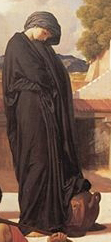User:DionysosProteus/Sandbox9
- Sandbox for the article on Andromache
| Andromache | |
|---|---|
 Captive Andromache (detail) by Frederic Leighton | |
| Written by | Euripides |
| Chorus | Women of Pharsalos |
| Characters | Andromache Maid Hermione Menelaus Molossos Peleus Nurse of Hermione Orestes Messenger Thetis |
| Original language | Ancient Greek |
| Subject | Andromache's life as a slave |
| Genre | Athenian tragedy |
| Setting | Pharsalos |
Andromache (Ancient Greek: Ανδρομάχη) is an Athenian tragedy by Euripides. It dramatises Andromache's life as a slave, years after the events of the Trojan War, and her conflict with her master's new wife, Hermione. The date of its first performance is unknown, although scholars place it sometime between 428 and 425 BCE.[1] A Byzantine scholion to the play suggests that its first production was staged outside of Athens, though modern scholarship regards this claim as dubious.[2]
Background
[edit]During the Trojan War, Achilles killed Andromache's husband Hector. The Greeks threw Andromache and Hector's child Astyanax from the Trojan walls for fear that he would grow up and avenge his father and city. Andromache was made a slave of Achilles' son Neoptolemus. Euripides dramatised these events ten years after Andromache in his tragedy The Trojan Women (425 BCE).
Years pass and Andromache has a child with Neoptolemus. Neoptolemus weds Hermione, daughter of Menelaus and Helen. Even though Andromache is still devoted to her dead husband Hector, Hermione is deeply jealous and plots her revenge. Fearing for her life and the life of her child, Andromache hides the child and seeks refuge in the temple of Thetis (who was the mother of Achilles).
Plot synopsis
[edit]Clinging to the altar of the sea-goddess Thetis for sanctuary, Andromache delivers the play's prologue, in which she mourns her misfortune (the destruction of Troy, the deaths of her husband Hector and their child Astyanax, and her enslavement to Neoptolemos) and her persecution at the hands of Neoptolemos' new wife Hermione and her father Menelaus, King of Sparta. She reveals that Neoptolemos has left for the oracle at Delphi and that she has hidden the son she bore him (whose name is Molossos) for fear that Menelaus will try to kill him as well as her.
A Maid arrives to warn her that Menelaus knows the location of her son and is on his way to capture him. Andromache persuades her to risk seeking the help of the king, Peleus (husband of Thetis, Achilles' father, and Neoptolemos' grandfather). Andromache laments her misfortunes again and weeps at the feet of the statue of Thetis. The párodos of the chorus follows, in which they express their desire to help Andromache and try to persuade her to leave the sanctuary. Just at the moment that they express their fearfulness of discovery by Hermoine, she arrives, boasting of her wealth, status, and liberty.
Hermione engages in an extended agôn with Andromeda, in which they exchange a long rhetorical speech initially, each accusing the other. Hermione accuses Andromache of practising oriental witchcraft to make her barren and attempting to turn her husband against her and to displace her. "Learn your new-found place," she demands. She condemns the Trojans as barbarians who practise incest and polygamy. Their agon continues in a series of rapid stichomythic exchanges.
When Menelaus arrives and reveals that he has found her son, Andromache allows herself to be led away. The intervention of the aged Peleus (the grandfather of Neoptolemus) saves them. Orestes, who has contrived the murder of Neoptolemus at Delphi and who arrives unexpectedly, carries off Hermione, to whom he had been betrothed before Neoptolemus had claimed her. The death of Neoptolemus is announced. The goddess Thetis appears as a deus ex machina and arranges matters.
Context
[edit]The odious character which Euripides attributes to Menelaus has been seen as according with the feeling against Sparta that prevailed at the time at Athens.[3] He is portrayed as an arrogant tyrant and his daughter Hermione is shown to be lecherous and murderous. Peleus curses Sparta several times during the play.
Translations
[edit]- Edward P. Coleridge, 1891 - prose
- Gilbert Murray, 1901 prose, 1912 verse
- Arthur S. Way, 1912 - verse
- Hugh O. Meredith, 1937 - verse
- Van L. Johnson, 1955 - prose
- John Frederick Nims, 1958 - verse
- David Kovacs, 1994 - prose
- Robert Cannon, 1997 - verse
References
[edit]Sources
[edit]- Cannon, Robert, trans. 1997. Andromache. In Plays: V. By Euripides. Ed. J. Michael Walton. Classical Greek Dramatists ser. London: Methuen. 1-62. ISBN 0413716406.
- Ley, Graham. 2007. The Theatricality of Greek Tragedy: Playing Space and Chorus. Chicago and London: U of Chicago P. ISBN 0226477576.
- Walton, J. Michael. 1997. Introduction. In Plays: V. By Euripides. Ed. J. Michael Walton. Classical Greek Dramatists ser. London: Methuen. vii-xxiii. ISBN 0413716406.
External links
[edit]
